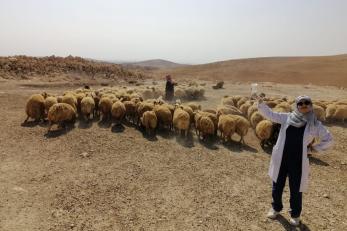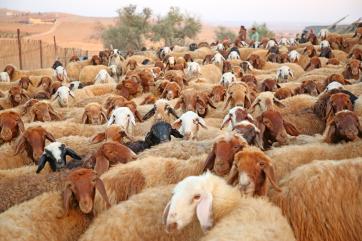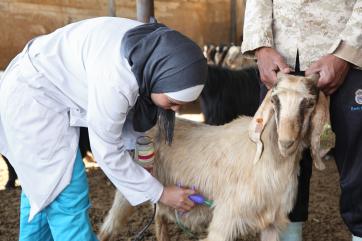Vaccination campaign reaches 270,000 animals

Dr Fatima stands proud in front of a flock of recently vaccinated sheep in Mafraq, where many of the dairy farms are located.
One of the main market constraints in the dairy sector in Mafraq is the lack of proper veterinary services available to goat and sheep herders, especially small-scale herders who typically only seek services in extreme cases.
In response, Mercy Corps’ Access to Justice and Jobs (A2J) program, in partnership with the Directorate of Agriculture (DoA) and private animal health clinics, conducted a vaccination campaign in Mafraq to improve support services and the overall growth of the dairy sector. The campaign specifically targeted the highly contagious Foot and Mouth Disease (FMD) which can cause reduction of milk yield by 80% and even death, ultimately impacting herders’ income.


The campaign, which ran from 10 October-10 November 2019, vaccinated nearly 270,000 sheep and goats against FMD. As a market systems development program, one of the main goals of the campaign was to strengthen linkages between the private and public sector actors for future collaboration and increased impact. With this goal in mind, A2J partnered with private animal health clinics to implement the campaign while the DoA served as the monitoring body.
The private animal health clinics hired para-vets—A2J trained vet agents who provide on-farm consultations, rudimentary services, and pharmaceutical promotion targeting small-scale herders—to administer the vaccines. The cost of the service as well as the vaccines themselves were covered by Mercy Corps, demonstrating the potential for a sustainable and collaborative model where the Directorate funds and the private sector implements similar campaigns in the future.
“While I was vaccinating 30,000 sheep and goats against FMD, I capitalized on the opportunity to raise herders’ awareness on the different diseases affecting animals,” said Dr. Fatima, a participating veterinarian. “Thanks to Mercy Corps’ support, the vaccination campaign increased my exposure and connections with local herders, increasing my customer base by 20% so far.”
Not only did the campaign help nearly 1,200 herders better plan for the season, the campaign expanded the networks of private clinics to reach herders in remote areas; established contacts between private clinics, animal pharmaceutical companies and the government; as well as raised awareness on best practices among herders. A more sustainable and equitable model of vet services equals a stronger dairy sector — and a better employment outlook for the country.
This project, funded by the Dutch Ministry of Foreign Affairs-Addressing Root Causes Fund, aims, in part, to increase employment opportunities in Mafraq and Irbid through market growth in the dairy and olive oil sectors.